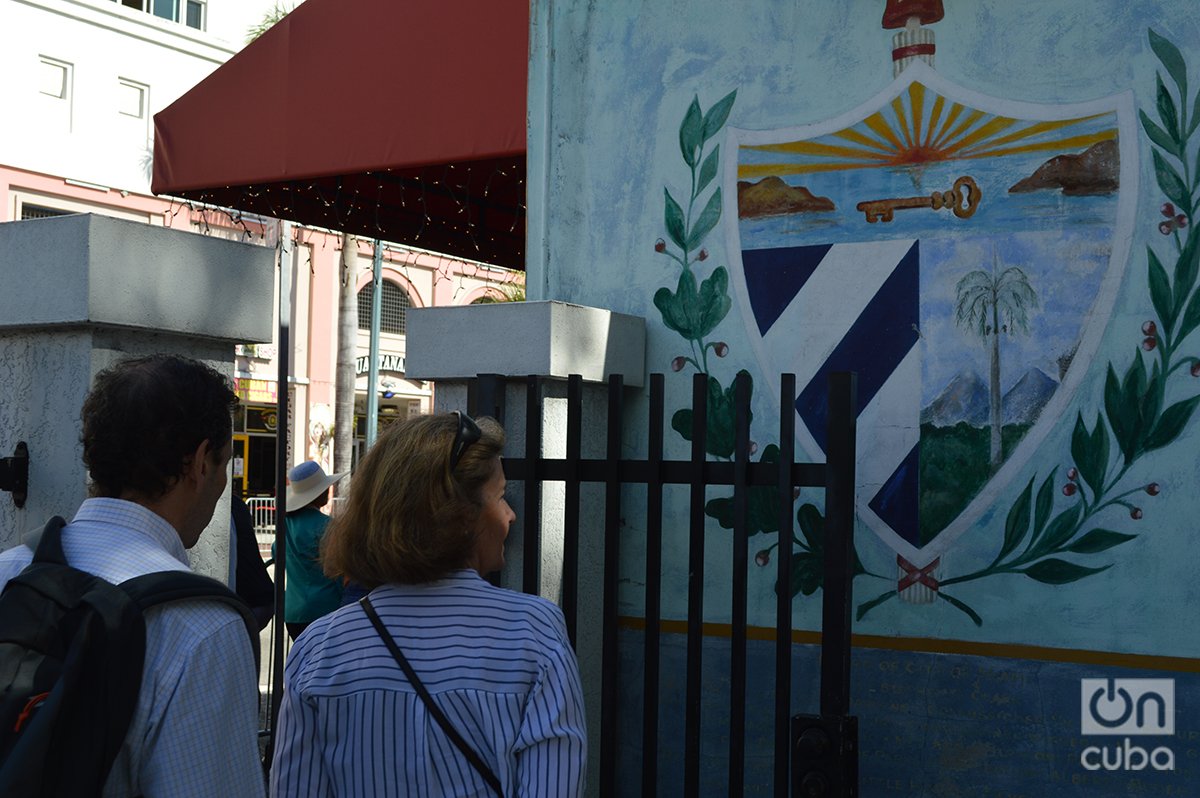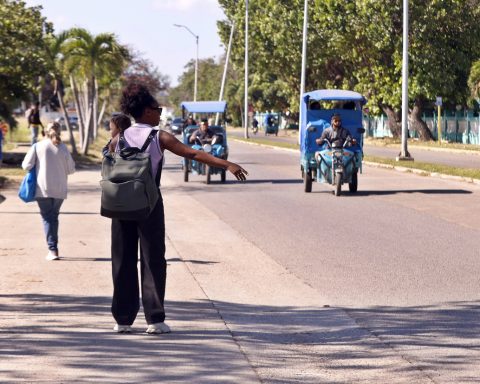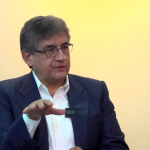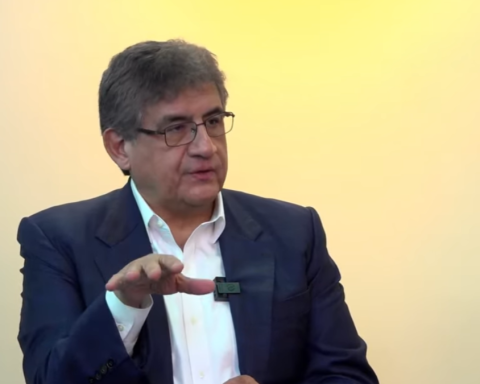Plus ça change, plus c’est la même chose.
Old proverb, actually Cuban.
It’s that time again. The Florida International University (FIU) Cuba Survey 2022, the longest-running research project designed to measure the political attitudes of South Florida’s Cuban-American population, is ready. We conducted the survey from the end of July to mid-September and now we are ready to reveal the results.1 We will present the figures of the Cuba 2022 Survey during the next days in OnCubaNews in five articles. In this first paper we will offer the results obtained regarding the attitudes of Cuban-Americans in South Florida towards the economic embargo (blockade) and the state of diplomatic relations between the two countries. In the next installment, we will cover some of the dynamics in the relationships between Cuban Americans and Cubans living on the island. In subsequent installments, data on the political profile of Cuban-Americans towards the US political process will be presented: the preferred candidates and the most important issues. We will conclude the series by comparing this year’s survey to those conducted during the Obama and Trump administrations as a way of discussing the forces driving changes and continuities in the political views of this enigmatic group.
Cuban-Americans and US-Cuba Relations: Slow-Mo Joe
The Biden administration has been slow to differentiate its approach to US-Cuba relations from the isolationist vision implemented by President Donald Trump. While the recent resumption of limited consular services and the promise to resume other services are steps in the right direction, there has been little change in the narrative associated with US-Cuba relations. There is much talk of helping the Cuban people while maintaining policies that squeeze the island’s economy as if the economy did not affect the well-being of the Cuban people.
Approximately 68% of Cuban Americans living in South Florida believe that the embargo has not worked.
Since the beginning of the FIU Cuba Survey in the early 1990s, the majority of Cuban Americans in South Florida have agreed on the following: The US economic embargo against Cuba has not worked. This year’s results are no different (Graph 1).
The question does not address the question of what the efficacy would look like. That is, we did not directly ask what respondents would consider to be a “successful embargo” (one that “works”), so each respondent is free to assess success/failure from their point of view. This year’s results show that 68% of those surveyed acknowledge that the embargo has not worked. It is interesting to note that newcomers (2015-2022) give higher ratings to the efficiency of the embargo (49%). For half of this group the embargo/blockade has been an “effective” policy, whatever it means to them.
The majority of the Cuban-American community supports the continuation of the embargo.
Regardless of their skepticism about its effectiveness, Cuban-Americans are not willing to give up their support for the longest-lasting coercive policy that the United States government has maintained against any country on the face of the earth. Support for maintaining the embargo remains high (Graph 2).

When we include the answer “I don’t know” as valid, approximately 57% of the Cuban-American community supports (43% strongly) the continuation of the US embargo on the island. When a definitive opinion is expressed—“yes, I support” or “no, I don’t support” maintaining the embargo—63% of respondents align in favor of the embargo. Anti-embargo sentiments dominate in only two cohorts: Cuban-Americans born outside the island and those who report being registered Democrats. I guess Coca-Cola will have to wait a little longer to open its factory in Cuba. Maybe things will change by the time you finish building your biggest factory in Vietnam.
The majority of Cuban Americans support the sale of food and medical products to Cuba by US companies.
Despite strong support for the economic embargo, Cuban Americans in South Florida are concerned enough about the well-being of their fellow Cubans who remain on the island to strongly support the sale of food and medicine. When respondents are asked if they support the sale of medicines or food by US companies to Cuba on an “unlimited” basis, food exports by US companies are supported by 64% (Graph 3) of the sample. and the export of medicines is endorsed by 72% (Graph 4) of those surveyed.
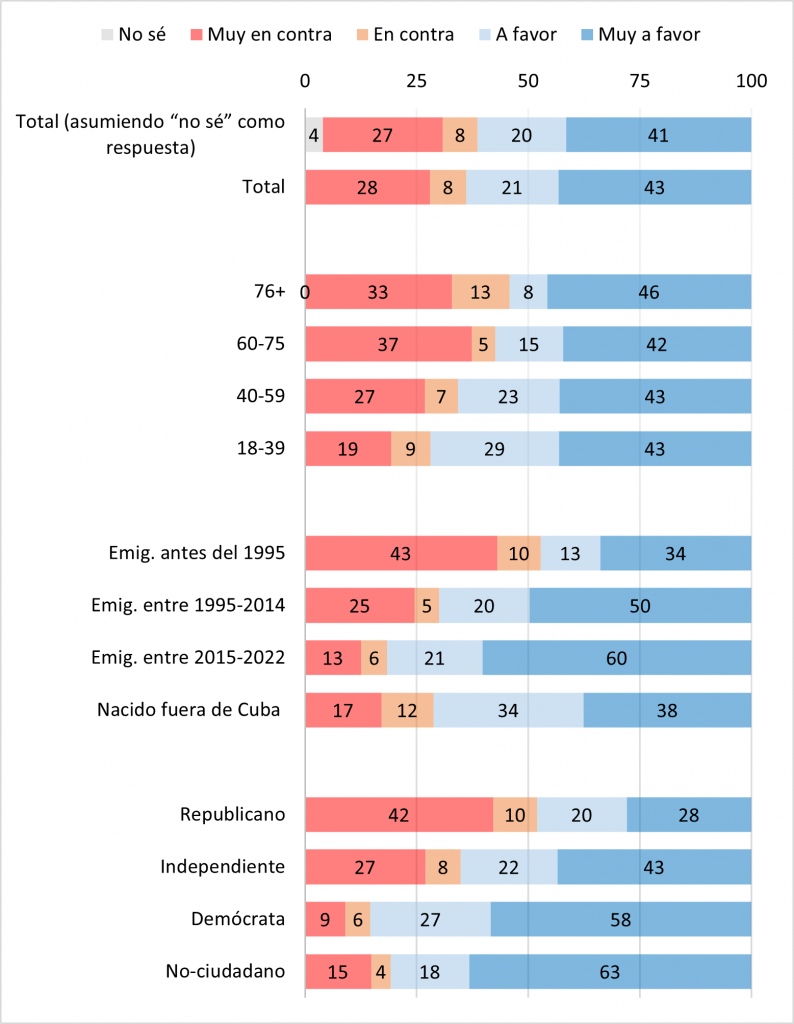
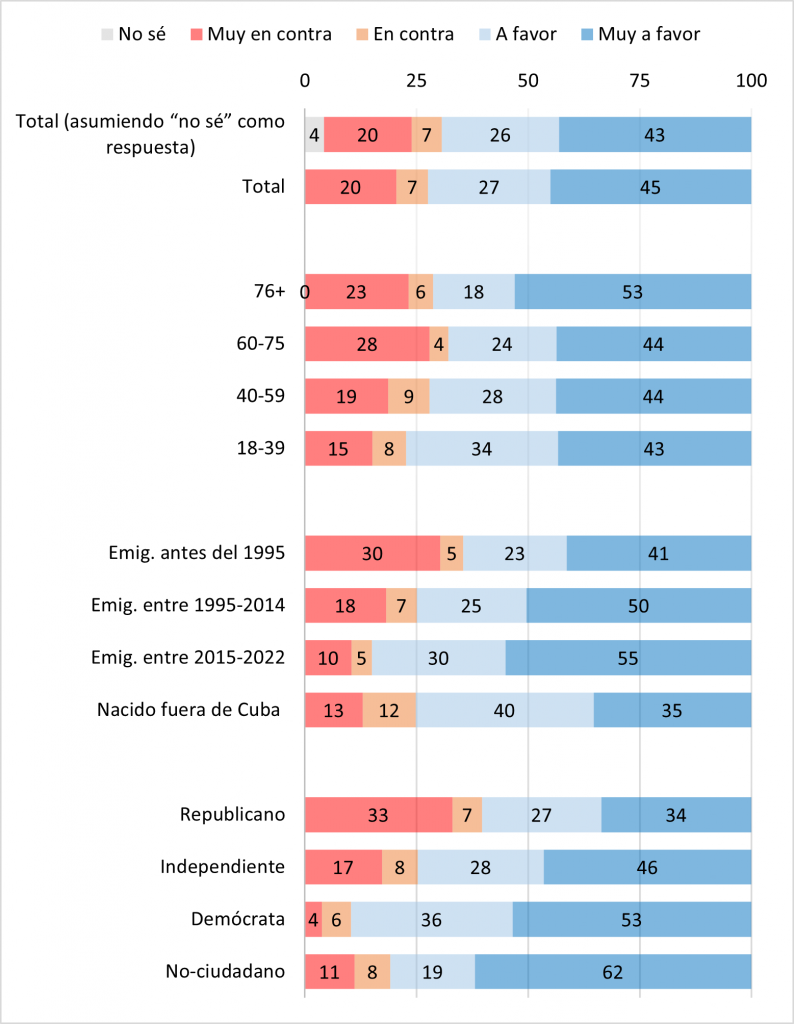
The politics of the carrot and the politics of the stick
Does Cuba represent a threat to vital US interests? Most say, “yes.”
The majority of Cuban Americans (55%) consider Cuba to be a threat to vital US interests (Chart 5).

This represents a slight increase from the 2020 survey when a slight majority (52%) did NOT consider Cuba to pose a threat to the United States. This time, only three groups in our survey disagree with this perception of Cuba as a threat: the generation of Cubans born outside of Cuba, newcomers, and those registered as Democrats.
Brandishing the stick: Most respondents support policies designed to exert maximum pressure on the Cuban government to promote regime change.
Since the beginning of the FIU Cuba Survey in the 1990s, the desire to brandish a punishing stick against the Cuban government while extending some kind of conciliatory carrot has been present in community attitudes toward Cuba. relations between the United States and Cuba. Stick politics have dominated US-Cuban relations since the 1960s, with the exception of initiatives taken by Obama during his second term. The Cuban-American community has room in its imagination for both soft and hard approaches. As we will discuss in our final conclusion, this ability to follow White House leadership on a “softer path” became evident as the community adjusted to the new normal of Obama openings prior to Trump’s whiplash.
This ambivalent carrot-stick attitude is clearly seen in the two questions that ask respondents to express their general political preference. Formulated non-specifically, both questions received overwhelming support. 74% of those surveyed approved of policies designed to exert maximum pressure on the Cuban government to promote regime change. All categories of respondents expressed overwhelming support for hardline policies (Chart 6).
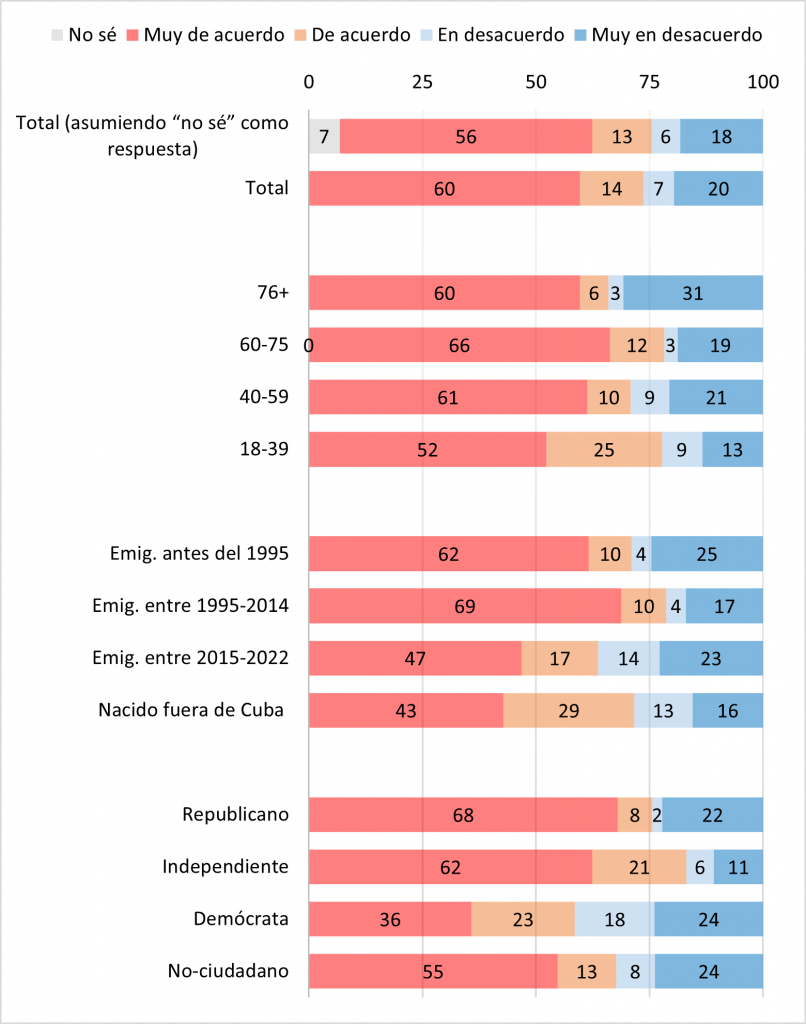
However, respondents are equally enthusiastic about policies designed to improve the well-being of the Cuban people. Overwhelming support is expressed for these “softer” policy approaches (64%). Only registered Republicans express opposition, by a slim majority (52%), to soft policies (Chart 7).
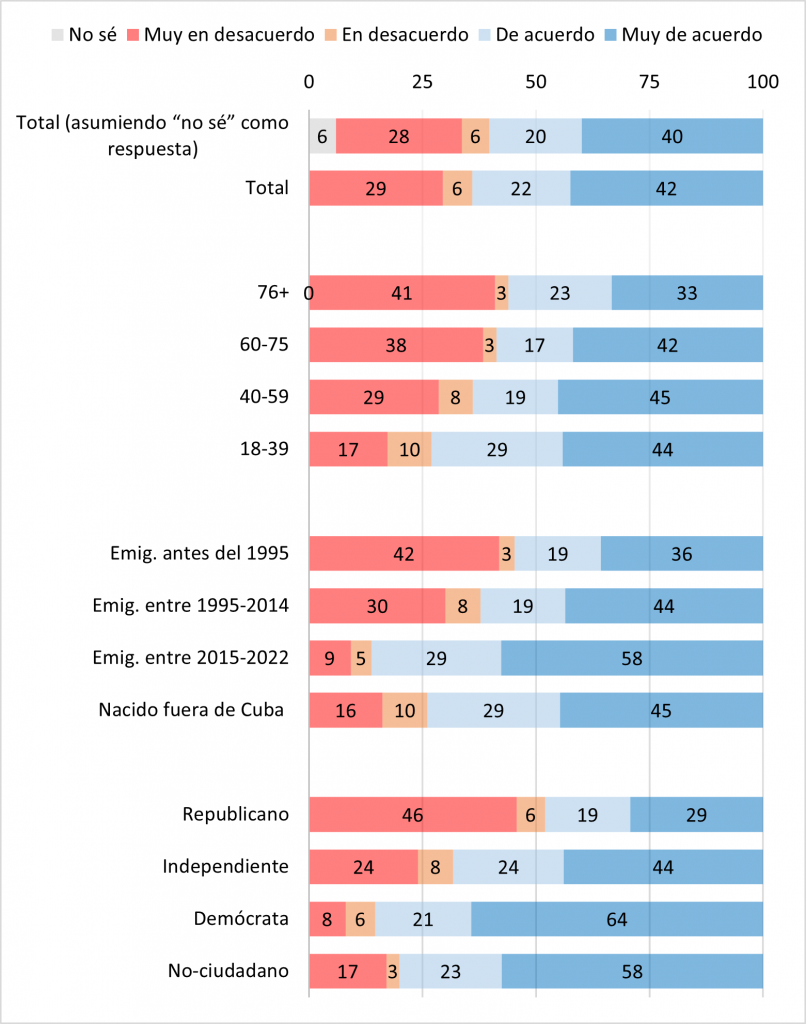
On the question of maintaining diplomatic relations
Since Obama established diplomatic relations with Cuba in 2015, Cuban-Americans have remained steadfast in their support for a new era in US-Cuba relations. However, there has been a steady decline in support for the policy since 2018. At that time 67% expressed support for maintaining diplomatic relations. This year support has dropped to 53% within the general population. What has become the status quo is opposed by those who immigrated before 1995, older cohorts, and registered Republicans (Chart 8).
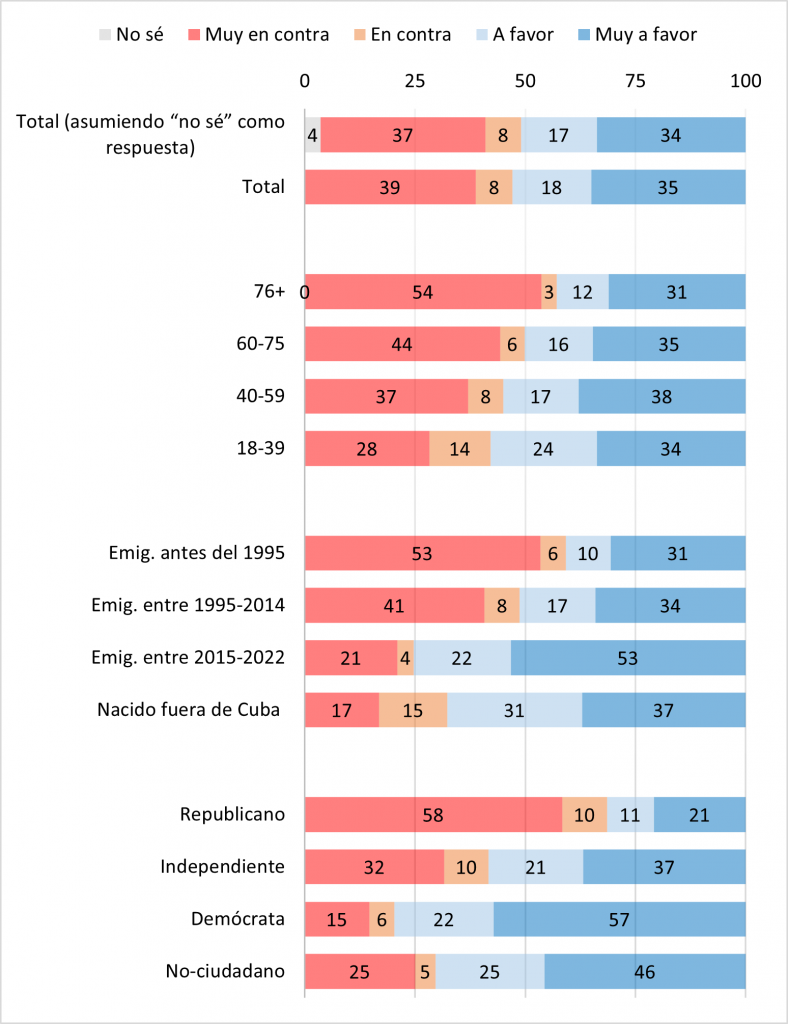
So the Cuban-American population remains firm in its way of thinking. Older members of the community seem to continue with the traditional “exile ideology” of opposition to the Cuban government by supporting the isolationist policies of decades ago. Newcomers and younger cohorts are integrating into the US political system in an extremely polarized environment, where the nature and impact of Cuba policy on its government and people are an afterthought for both. parties (Democratic and Republican), and not a consistent strategy. Given Washington’s lack of leadership to significantly alter its policies toward Cuba, it is not surprising that the Cuban-American population has not altered course either. Leadership matters, as we will see in subsequent analysis of the 2022 FIU Cuba Survey.
Next: What is the state of relations between Cuban Americans and their compatriots on the island?
***
1 Following the methodology used in previous surveys, waves, the FIU Cuba Poll 2022 surveys a sample of 1,000 self-identified Cuban adults (ages 18 and older) currently living in Miami-Dade County (MDC). The margin of error typically associated with such a random sample is plus or minus 3%. The sampling frame consists of all LAN and cellular numbers that comply with the Telephone Consumer Protection Law that operate in the area. A probabilistic sample was constructed using the random digit dialing (RDD) procedure. Since our previous surveys have always favored older respondents due to their higher response rates, this survey assigned younger Cuban Americans a higher probability of being in the sample. The FIU contracted with NORS Surveys, Inc. to conduct the interviews. Respondents who self-identified as Cuban were interviewed using our bilingual (English and Spanish) questionnaire and Computer Assisted Telephone Interviewing (CATI) system. Data collection took place between July 27 and September 11, 2022. All results presented in this report are weighted to better represent the predicted population. More information about the methodology can be accessed by visiting the website of the Cuban Research Institute and its link FIU Cuba Survey 2022.
